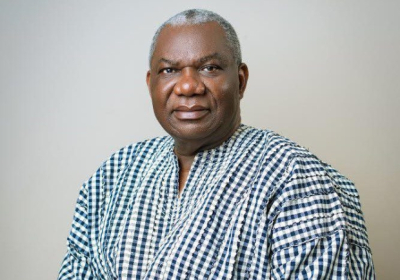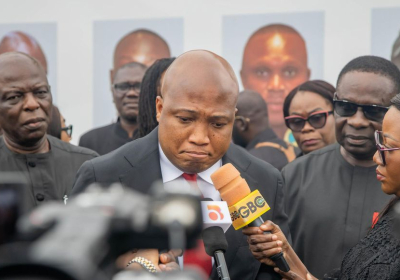Solomon Owusu Critiques NPP and NDC, Promises Real Change with Movement for Change in 2024
.jpeg)
Solomon Owusu, a prominent figure within the Movement for Change, recently opened up about how their campaign is progressing and the unique approach they are taking compared to the more established political parties in Ghana, particularly the New Patriotic Party (NPP) and the National Democratic Congress (NDC). According to Owusu, their campaign strategy is in stark contrast to the traditional methods employed by the NPP and NDC, with the focus being on grassroots engagement and direct interaction with the people of Ghana.
A Different Approach to Campaigning
Speaking on Deglory tv/radio's Ghana Gyina Sen, Last fridey, Owusu emphasized that, unlike the NPP and NDC, which have the financial resources to transport people from various regions to attend their rallies, the Movement for Change takes a different approach. The NPP and NDC typically organize large events, often hiring buses to transport supporters, capturing photos of large crowds, and leaving after the event. For the Movement for Change, however, the emphasis is on personal, door-to-door engagement, taking the campaign directly to the people. Owusu highlighted that they are going beyond the cities, reaching out to towns and rural areas with a unique method of campaigning. They not only visit homes but also organize meet-and-greet sessions and caravans, which allow them to interact closely with communities.
Furthermore, he pointed out that the leadership of the Movement for Change is not confined to a single area. The leaders have made it a point to spread themselves across the entire country, ensuring that no region is left behind in their campaign efforts. This nationwide approach, Owusu believes, sets them apart from the other political parties and makes their movement stand out as truly people-centered.
A Campaign Built on Hard Work and Dedication
Owusu described the campaigning efforts of the Movement for Change as different from anything Ghanaians have seen in recent times. The difficulty of campaigning in such challenging times, he said, is something that the Movement for Change is willing to endure in order to bring about the needed change in the country. He expressed his belief that, come December 7th, 2024, Ghanaians will be surprised by the support and turnout for the Movement for Change, as people are looking for a new direction after years of disappointment from the traditional political parties.
A Call for Change After 32 Years of Struggle
Owusu took the opportunity to reflect on the history of Ghana’s political landscape, especially since the beginning of the Fourth Republic 32 years ago. He pointed out that the NPP and NDC have been the only political forces able to lead the country, and as of January 7th, 2025, both parties will have spent a combined total of 16 years in power. Despite their time in office, however, Owusu argued that the country is still struggling, with many Ghanaians facing hardship. He stressed that despite the promises made by these parties, the people of Ghana continue to suffer from economic difficulties and a lack of real development.
According to Owusu, the problem lies in the way the two major parties have managed the country. He explained that political manifestos, which are often filled with promises, have become a tool for political parties to gain power but have rarely led to meaningful change. Instead of focusing on the welfare of the people, manifestos have become a vehicle for political parties to make empty promises that are never fulfilled.
Proposals for National Development
Solomon Owusu also took the time to outline the core proposals of the Movement for Change and how they plan to address the country’s ongoing challenges. He mentioned that their manifesto focuses on concrete steps that would directly benefit Ghanaians. One of the key promises is to reduce import taxes to make it easier for local industries to thrive. By lowering these taxes, the Movement for Change hopes to stimulate local production and reduce the country’s dependency on imports.
Owusu also highlighted plans to establish domestic industries, including a vehicle manufacturing company that would not only serve the local market but also enable Ghana to export vehicles to other countries. Additionally, they plan to set up an iron and steel company that would make use of the country’s natural resources, such as bauxite and iron ore, to create sustainable industries that can provide jobs and promote economic growth.
In addition to these industrial plans, Owusu shared the Movement for Change’s commitment to improving the lives of farmers. He explained that the party intends to provide better access to farm materials and ensure that farmers can work with the tools and resources they need to succeed. This, he said, would lead to happier and more productive farmers, ultimately benefiting the entire agricultural sector.
Combating Corruption and Strengthening the Judiciary
Another key element of the Movement for Change agenda is the fight against corruption. Owusu made it clear that the party is committed to eradicating bribery and corruption from Ghana’s political and economic systems. They plan to implement strong anti-corruption measures, including initiatives like the life child ordination, which aims to ensure that corrupt practices are rooted out.
In terms of judicial reforms, the Movement for Change is proposing changes to the way judges are appointed. They believe that the current system, in which judges are appointed by the executive, often leads to conflicts of interest. To address this, they suggest a new system where judges would be selected by their peers, ensuring greater independence and fairness in the judicial process.
A Candid Critique of the NPP’s Promises
Owusu also took time to criticize the NPP’s record on economic development. He pointed to the promise made by Allan Kyerematen, who was responsible for the Ministry of Trade and Industry, to implement the One District, One Factory (1D1F) initiative. Despite the NPP’s pledge to create factories in every district, Owusu argued that the party had failed to deliver on this promise. He suggested that the Movement for Change is more trustworthy when it comes to implementing realistic and sustainable economic policies.
The Youth: A Key Pillar of the Movement
Another important point that Owusu raised was the significant role the youth are playing in the Movement for Change. He explained that the youth of Ghana have found hope in the policies of the movement and are actively supporting their campaign. This support, he believes, will be a major factor in their success in the upcoming elections.
Owusu is confident that the Movement for Change will win the 2024 elections, possibly through a run-off, as the party’s policies resonate strongly with Ghanaians who are yearning for real change.
Vigilance in the Face of Electoral Challenges
Despite their growing support, Owusu voiced concerns over the credibility of the Electoral Commission (EC) and the transparency of the electoral process. He expressed distrust in the way the EC is handling its duties and stated that the Movement for Change is staying vigilant. The party has been training its polling agents extensively to ensure that they are well-prepared to handle any challenges that may arise during the election.
In conclusion, Owusu made it clear that the Movement for Change is ready to bring the change that Ghana so desperately needs. With their focus on grassroots campaigning, anti-corruption efforts, industrial development, and empowering the youth, they believe that they are the only party that can provide a real alternative to the status quo. As the election draws closer, Owusu and the rest of the Movement for Change leadership remain optimistic about their chances of success and are determined to offer a brighter future for all Ghanaians.
Watch Video Below







